Learn the best political marketing strategies to build a successful online reputation, build trust, and communicate your message effectively.
The importance of political marketing in the digital age
In the digital age, political marketing has taken on a central role in determining the success of an election campaign.
It is no longer just about campaign posters and rallies, but about a well-planned and strategic online presence.
With the ever-increasing use of social media, online reputation has become a critical factor in gaining the trust of voters.
The challenge of political marketing in the digital age is twofold.
One is the need to adapt quickly to new platforms and changes in user behavior.
On the other, there is the complexity of navigating an environment where fake news and misinformation can spread rapidly, potentially creating reputational damage and swaying public opinion.
For example, according to a survey conducted by Statista, 42% of US users saw false or misleading information about political issues online in February this year.
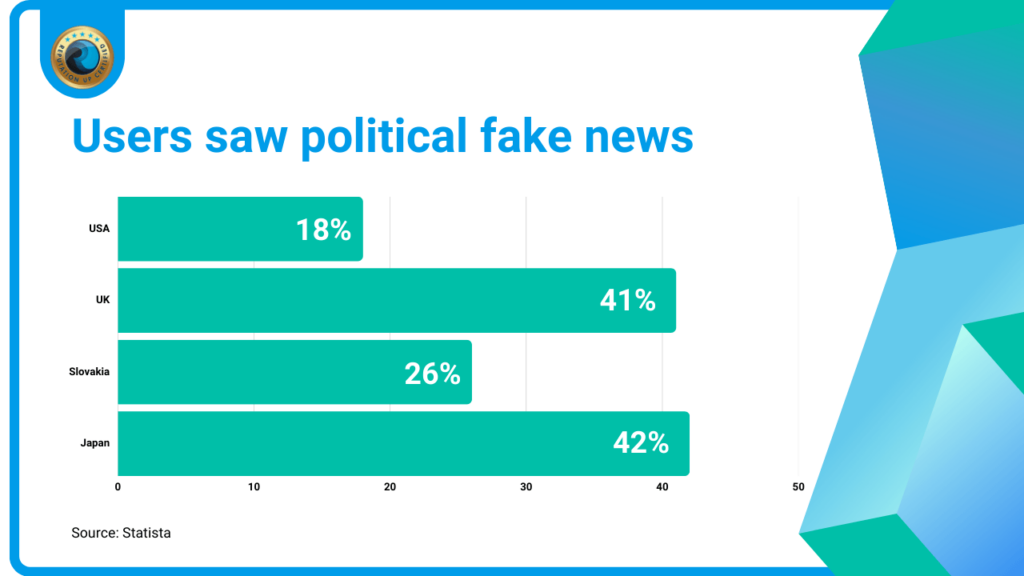
The lowest percentage is in Japan, where only 18% of users have been affected by fake news.
The chart shows that to meet these challenges, politicians and their campaign teams need to be well versed in digital as well as traditional marketing techniques.
They must be able to effectively use tools such as SEO, online advertising, email marketing and, of course, social media.
The basics of online political marketing
Online political marketing is a complex ecosystem that requires a deep understanding of multiple tools and platforms.
The main pillars are social media, email marketing and SMS marketing.
Each tool has a specific role to play.
Platforms such as Facebook, Twitter and Instagram provide a way to interact directly with voters, respond to their questions and concerns, and build a community around the candidate or party.
Email marketing, on the other hand, provides a more private and direct channel to communicate with voters.
It’s especially useful for sending detailed updates, donation requests, and other communications that require more space and attention than a social media post.
Definition of political marketing and its relevance in the digital sphere
Political marketing is the art and science of influencing public opinion in favor of a candidate, party, or political cause.
The Cambridge Dictionary gives a useful definition of marketing as:
“The business activity that involves finding out what customers want, using that information to design products and services, and selling them effectively.”
Applying this concept to politics means using persuasion techniques and audience research within an election campaign.
Traditionally, this was done through media such as television, radio and newspapers.
However, the advent of the Internet and social media has greatly expanded and complicated the field of political marketing.
According to StackAdapt, 65% of adults in the United States gather information about upcoming elections through digital channels.
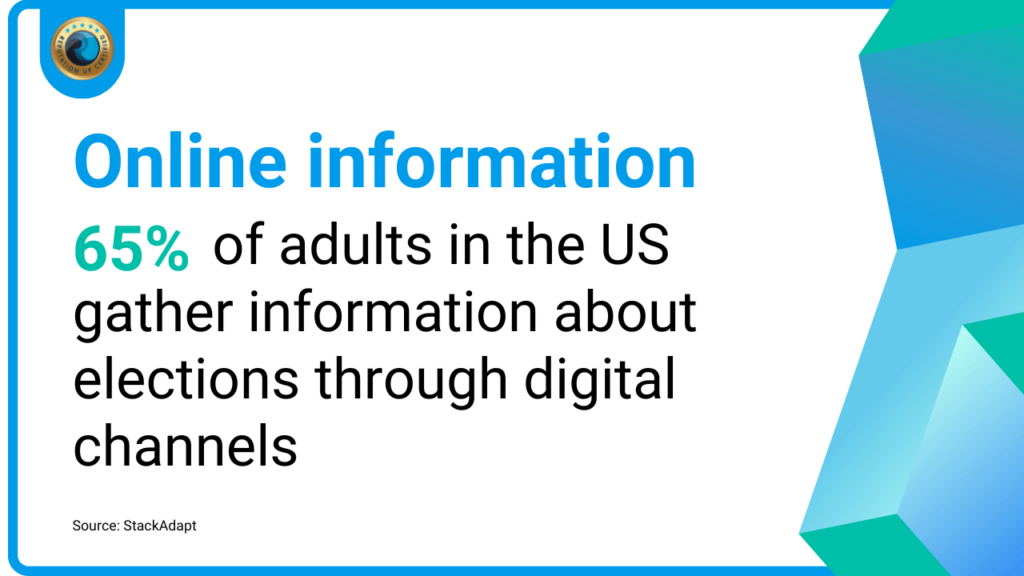
In the digital realm, political marketing goes far beyond simple advertising and includes a wide range of activities such as social media management, search engine optimization (SEO and SEM), email marketing, and more.
These digital tools offer new opportunities to reach and engage with larger and more diverse audiences, but they also bring new challenges in terms of online reputation management and privacy compliance.
Trust the experts at ReputationUP for online reputation services combined with political marketing.
The impact of online reputation on political success
Online reputation has become a critical factor in the success or failure of a political campaign.
In an increasingly connected world where information travels fast, a single tweet, Facebook post or blog article can have a significant impact on public opinion.
The same can be said for a commercial business with respect to negative reviews: in this context, the comments and reactions of future voters count as reviews.
Something as simple as responding to a negative comment in a professional and timely manner can go a long way toward mitigating the damage and showing that you care.
Conversely, ignoring or overreacting can make the situation worse and further damage your reputation.
Developing an effective political marketing strategy
Developing an effective political marketing strategy is a complex task that requires detailed planning and careful execution.
Here are some of the basic steps:
- Market research:
Understanding your target audience is critical to any successful campaign; it is vital information for developing messages that resonate with this demographic.
- Develop a clear and consistent message:
This should reflect not only the candidate’s policy positions, but also the values and aspirations of the target audience.
The message must then be integrated into all aspects of the campaign, from online advertising to public speaking. - Use different communication channels:
Each channel has its strengths and weaknesses, and the key is to use them in complementary ways to reach the widest possible audience.
- Monitor and adjust:
Political campaigns are dynamic, so it is essential to closely monitor performance metrics as they are highly variable.
This is the only way to constantly evaluate the effectiveness of the campaign and make the necessary changes.
In summary, an effective political marketing strategy is a balanced mix of thorough research, consistent messaging, effective use of communication channels, and ongoing monitoring.
Audience research and analysis: know your audience
Knowing your audience is critical to any political marketing campaign.
It’s not just about identifying a demographic, it’s about understanding their concerns, needs and aspirations.
However, you shouldn’t go as far as microtargeting.
With this term, the ICO identifies:
“A form of online targeted advertising that analyses personal data to identify the interests of a specific audience or individual in order to influence their actions. Microtargeting may be used to offer a personalised message to an individual or audience using an online service such as social media.
Microtargeting may determine what and how relevant content is delivered to an individual online and is sometimes used to market goods or services and for political marketing.”
A Gallup poll shows that 72% of Americans believe that Internet companies should not share information about their users with political campaigns.
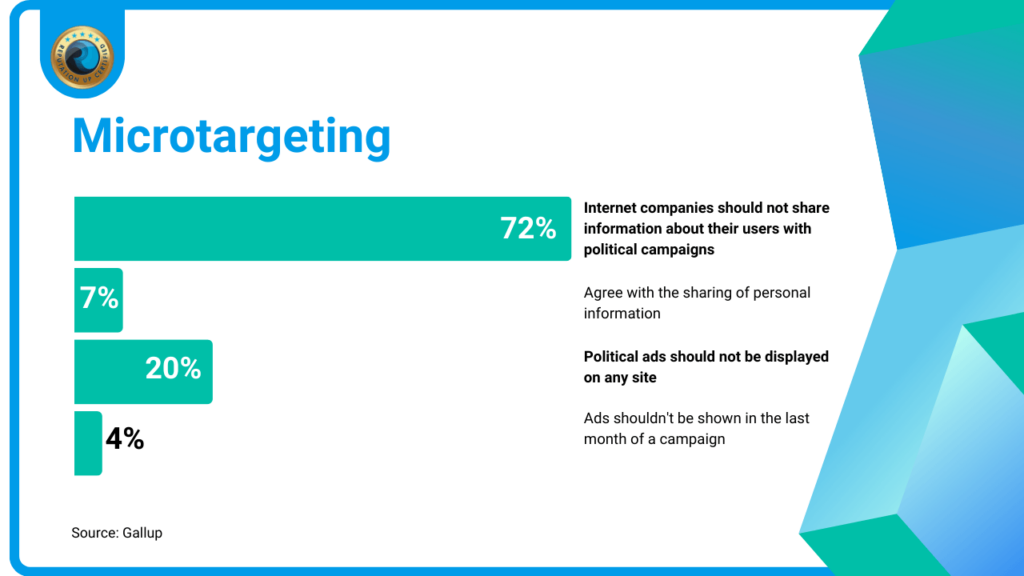
Only 7% agree with the sharing of personal information, in line with Facebook’s policy, which does not limit ad targeting.
On the other hand, 20% believe that political ads should not be displayed on any site, a policy recently adopted by Twitter.
And 4% say ads shouldn’t be shown in the last month of a campaign.
Understanding the target audience, however, can be achieved through a variety of less controversial methods, including surveys, interviews, and social media data analysis.
Once this data is collected, the next step is analysis.
This can include segmenting the audience into different groups based on various factors such as age, gender, geographic location, and political orientation.
Segmentation allows you to personalize communications, including the tone and content of the message.
Creating a solid digital identity: building an authentic image
Nowadays, a strong digital reputation is more critical than ever to political success.
This goes beyond simply creating a website or social media profiles; it’s about creating an authentic image that resonates with voters and builds trust.
The first step in building this identity is consistency.
From the party’s logo and colors to the types of content shared, every element should align with the campaign’s overall message and goals.
This consistency helps build a recognizable brand, a solid brand identity that voters can associate with certain values and ideas.
Another fundamental issue is authenticity.
Voters are increasingly skeptical of politicians and are quick to spot signs of inauthenticity.
It is therefore crucial to be transparent, honest and open in all online communications, as demonstrated by the campaign of Giorgia Meloni, who managed to capture a large part of the electorate through online work.
The third key component is interaction: an online presence is not a monologue, but a dialog with voters.
This type of interaction not only improves your online reputation, but can also provide valuable feedback that can be used to further refine your marketing strategy.
Content management: creating relevant and engaging political messages
The content that a candidate or party chooses to share can have a significant impact on public perception and the likelihood of electoral success.
Therefore, it is critical to create political messages that are not only relevant, but also engaging.
- The first step in content management is planning.
This involves creating an editorial calendar that takes into account various factors, such as upcoming political events, holidays, and other key moments that could provide opportunities for effective messaging.
Especially in the final stages of an election campaign, it makes sense to keep an eye on current events.
Statista’s chart shows that 23% of US users have changed their mind about a social or political issue because of something they saw on social media.
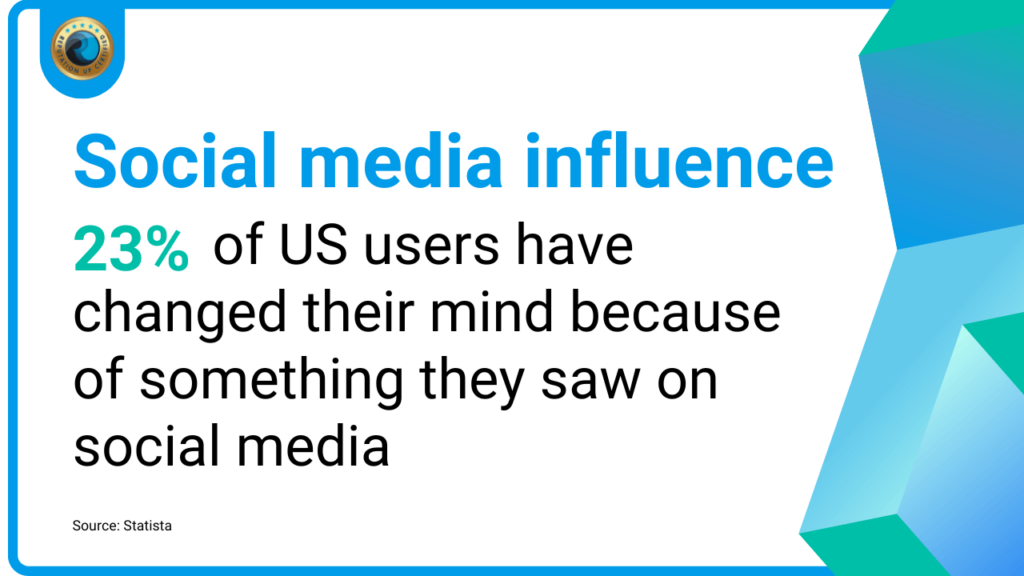
- The second step is production.
This can take a variety of formats, from blog articles and social media posts to videos and podcasts: whatever the format, it is essential that the content is high quality, well researched and, above all, authentic.
- The third and final step is analytics.
It is important to monitor how users are responding to the content.
This involves using social media monitoring tools to track metrics such as views, shares and, most importantly, engagement.
This data can provide valuable insights into what is resonating with constituents and what may need further tweaking.
In the hands of our expert team, this data makes all the difference in creating an effective communications plan.
Using social media: extend your reach and engage voters
Platforms such as Facebook, Twitter, Instagram and LinkedIn offer unique opportunities to reach and engage large and diverse audiences.
Messaging applications should also be included in this category to cover the email and Whatsapp marketing front.
According to Mailchimp data, the average open rate for emails with political content is 22.94%, slightly higher than the overall average of 21.33%.
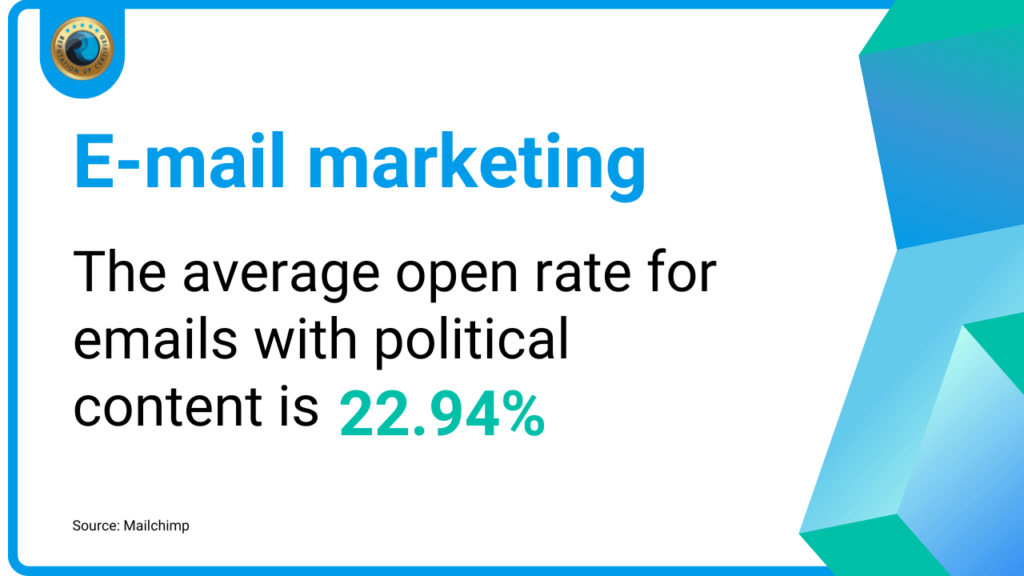
The situation changes when we look at government email campaigns, which instead take the top spot with 28.77%.
However, realizing the full potential of social media requires more than just a presence; it requires a well-thought-out strategy.
According to an article from Florida International University, Americans are split on the effectiveness of social media for political campaigns.
55% believe social media is an effective tool for communicating with voters.
However, 54% say they feel uncomfortable using it to communicate with voters.
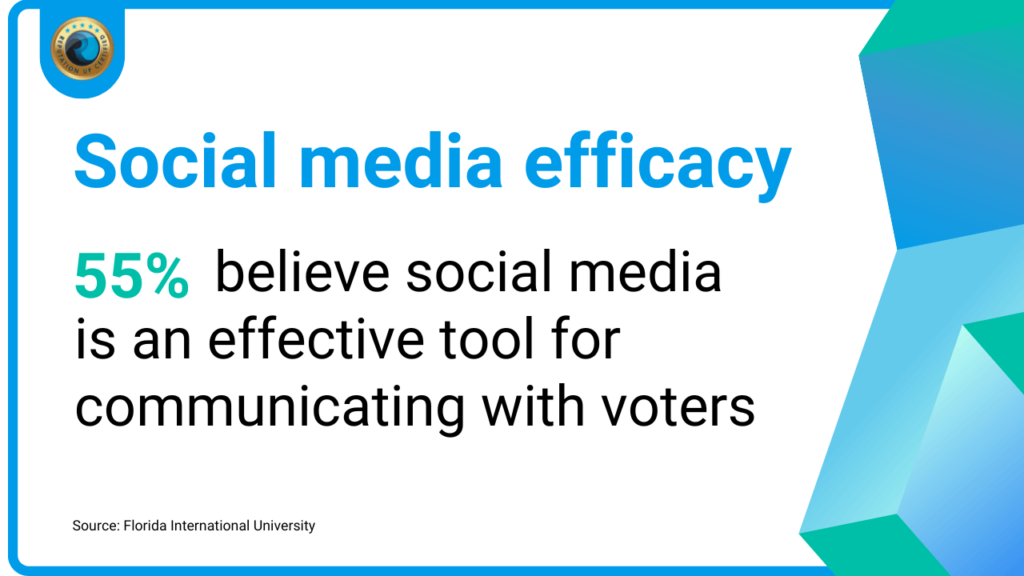
The first step is to choose the right platforms: not all social media are the same; each has a different audience and style.
For example, Instagram may be more effective for reaching a younger audience, while LinkedIn is more appropriate for professionals and entrepreneurs.
The same goes for content, which needs to be different for each social network.
It’s also important not to overload users with too much content or too close together, so it’s necessary to be clear about the key points of the political campaign.
Monitoring and managing online reputation in politics
One of the most effective tools for online reputation monitoring is the use of specialized software that can track mentions, reviews, and comments across multiple platforms.
These tools can provide real-time alerts, allowing for a quick response to any potential issues.
In addition, analysis of the data collected can provide valuable insights into public perceptions and areas that may need attention.
The RepuUP Monitoring Tool, our patented software, can provide you with all these features in a single tool with proven effectiveness.
In addition to monitoring, active reputation management is equally important.
This can include everything from addressing and resolving complaints or concerns to posting content that reinforces a positive image.
For example, if a candidate is being criticized for a political position, publishing articles or videos that clearly and rationally explain that position can help mitigate the damage.
To understand the importance of reputation monitoring and management, consider this data from Review42:
- Online research is the most trusted source of information for 65% of people;
- 93% of searchers never look past the first page.
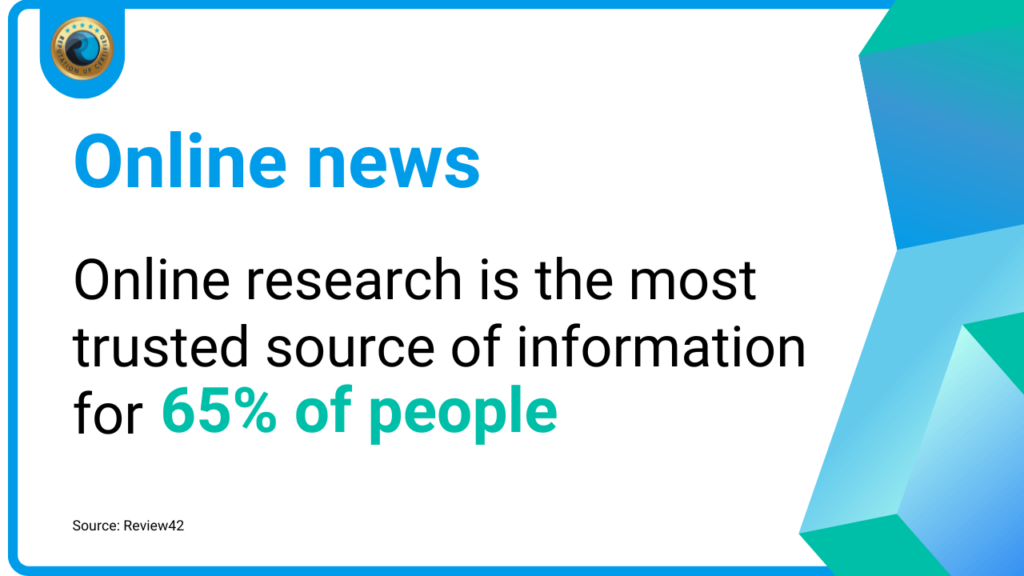
This means that having the first page of the search engine full of positive results is a primary goal for a successful campaign.
Another important aspect is having a crisis management plan in place.
Having a plan in place to deal with potential reputational crises can be the difference between a minor mishap and a disaster.
This plan should include a dedicated team, communication guidelines during the crisis, and a post-crisis reputation repair strategy: contact ReputationUP to get it all in one team.
The importance of ongoing online reputation monitoring for politicians
Online reputation monitoring is essential for any politician who wants to maintain a positive and influential digital presence.
One of the benefits of continuous monitoring is the ability to identify and address potential problems before they become crises.
In addition, continuous monitoring provides valuable data that can be used to further improve your marketing strategy.
This includes information about what types of content generate the most engagement, what topics are most important to audiences, and how opinions change over time.
Finally, continuous monitoring is essential to maintaining trust and credibility.
With that in mind, don’t underestimate reputation management on Wikipedia: as reported by Review42, Wikipedia appears on the first page of Google search results for 99% of searches.
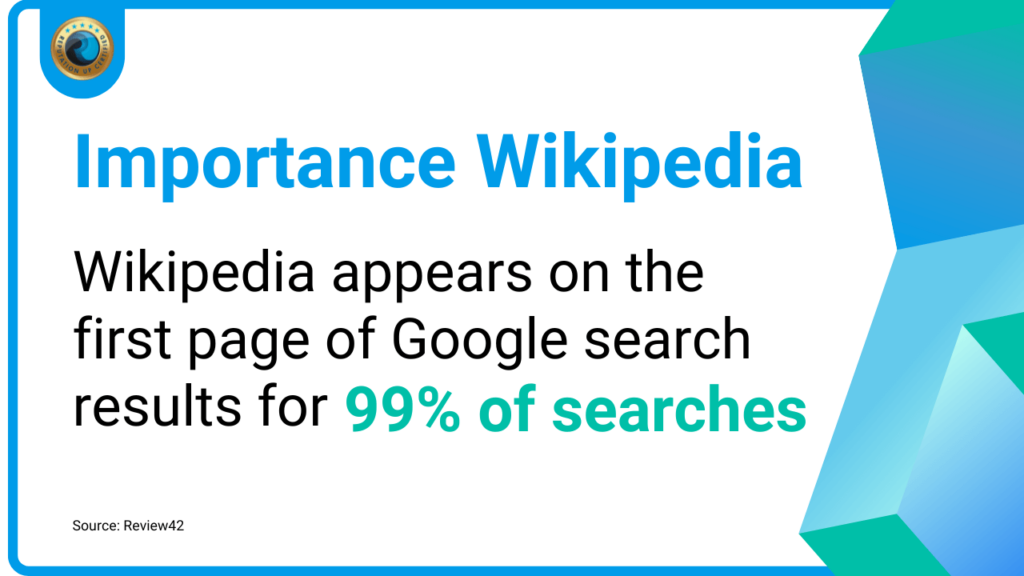
Considering this fact, every politician should create their own page on this medium in order to secure a place in the first search results for their name.
Online reputation management tools and techniques for politicians
Taking all these variables into account, it is clear that online reputation management is a complex task.
We’ve already talked about the importance of using mentions tracking software.
These programs scan the web to find every time a name or brand is mentioned, providing a real-time stream of feedback that can be analyzed and used to inform future strategies.
Equally useful is customer relationship management (CRM) software, which can help track interactions with constituents and other stakeholders.
This can be particularly useful for managing media requests, answering frequently asked questions, and maintaining a database of contacts that can be used in future campaigns.
In addition to software, there are specific techniques that can be used to improve online reputation.
For example, search engine management (SEM) can be used to ensure that positive content appears in search results while negative content is pushed down.
According to ZipDo, the average ROI of a well-executed SEM campaign is 275%.
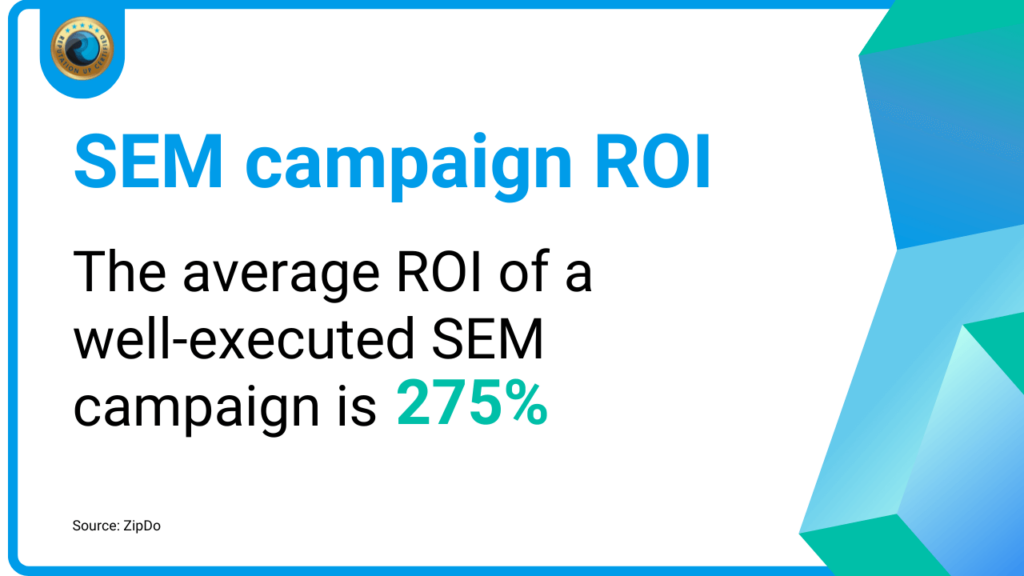
Likewise, online public relations (PR) techniques can be used to spread positive messages through press releases, blogs, and other communication channels that affect SEO.
Every politician should have a personal page with a blog section that contains news of public interest.
Another effective tactic is to use user-generated content, such as reviews and testimonials, to build credibility and trust.
Crisis management and effective response to public opinion
For any politically exposed figure, crises are inevitable: the key is to be prepared and have a well-defined plan of action.
The first step in crisis management is to quickly identify the problem, which is why constant and continuous monitoring is so important.
A tool that’s within everyone’s reach, as simple as it is effective in this sense, is the activation of Google Alerts with the keywords of interest.
This free software offered by Google is particularly useful with the candidate’s name, as it allows you to receive an alert every time it is mentioned online.
Once the problem is identified, it is critical to communicate quickly and openly with the public.
Ignoring the situation or delaying a response can exacerbate the crisis and further damage your reputation.
Communication during a crisis needs to be clear, consistent and transparent.
In addition to external communications, it is important to manage public opinion through other channels.
This can include using trusted influencers or spokespeople to spread a positive message, or using targeted advertising to correct misinformation.
According to a Gallup poll, only 36% of U.S. citizens trust traditional sources of information (television and the press), so it is important to cover other areas as well.
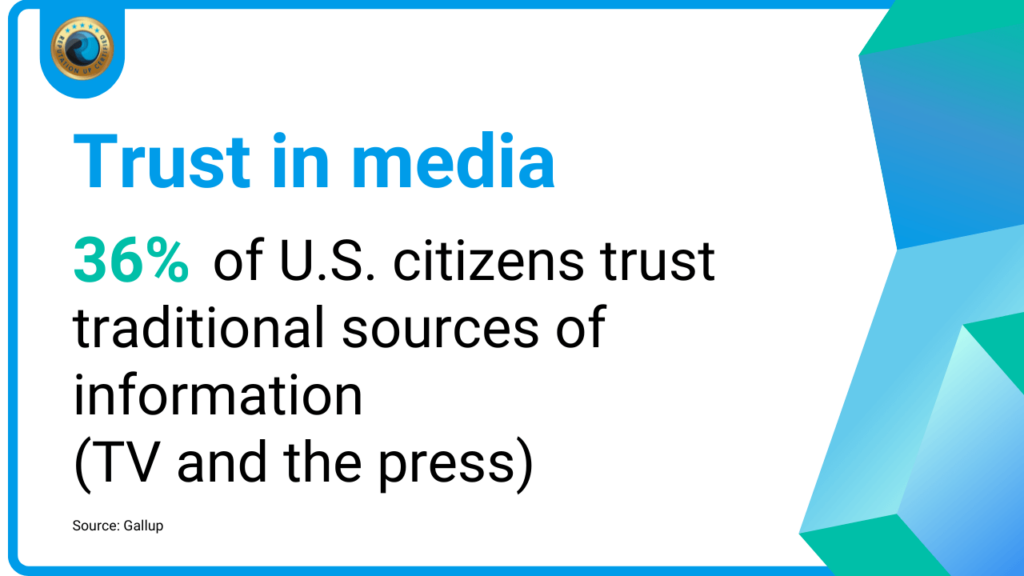
Finally, once the crisis has been resolved, it is critical to analyze what went wrong and how it can be prevented in the future.
This should include a detailed analysis of the events, identification of any gaps in the risk management strategy, and implementation of improvements.
Ethics and transparency in online political marketing
Ethics and transparency are fundamental concepts in online political marketing.
At a time when misinformation is rampant and trust in institutions is declining, maintaining high ethical standards and operating with transparency is more important than ever to build and maintain public trust.
One of the most critical aspects of ethics in political marketing is the truthfulness and accuracy of information.
It is essential that all statements and claims are based on verifiable facts, and that all data and statistics are accurate and up-to-date.
An MIT study on the 2020 election found that fake news is 70% more likely to be re-shared on Twitter than real, verified news.
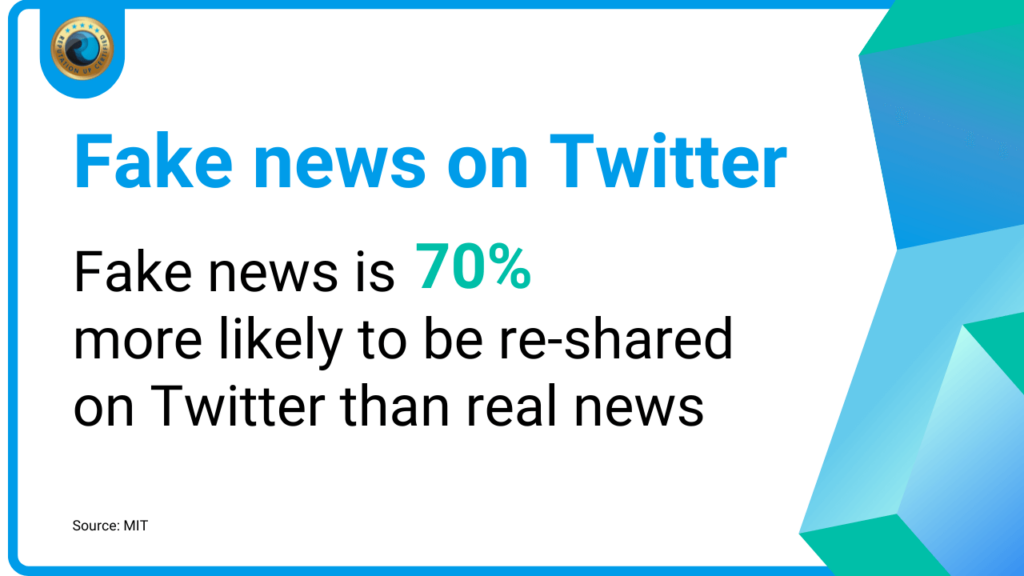
They also reach the top 1,500 people six times faster.
And the effect is more pronounced for political news than for other categories.
Another fundamental ethical pillar is transparency.
This means being open and honest about who is funding a campaign, how voter data is being used, and what the real intentions are behind a particular strategy or message.
In addition to these core principles, it is also important to consider the ethical implications of using technology.
For example, the use of algorithms and artificial intelligence to analyze voter data and personalize messages can raise ethical questions about privacy and public perception.
This issue has broadened as it has become possible to conduct political campaigns in the metaverse.
The basic idea is that the same values and principles of the offline world should be kept in mind.
Ethical principles in digital political marketing
While ethics in political marketing is a broad concept that covers a variety of issues, there are some core principles that must guide any digital campaign:
- Honesty: it is imperative that any statement or claim made in a campaign is accurate and verifiable;
- Transparency: not only does it help build trust with voters, it can also provide a level of accountability that can be helpful in the event of disputes or ethical issues;
- Respect for individual privacy and autonomy: it is essential that the information collected during the campaign is used ethically and with the full consent of the individuals involved.
It is important to note that, according to Pew Research, 77% of users do not agree with social media companies using data about their users’ online activities to show them political campaign ads;
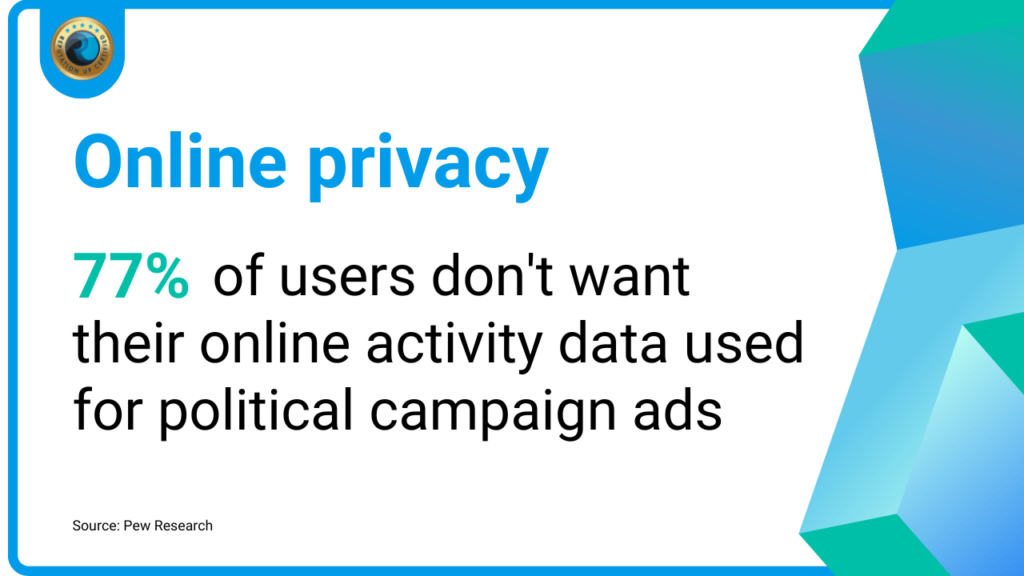
- Integrity: it is the foundation upon which trust is built, and without trust, no political campaign can hope to succeed.
Ignoring these principles can not only damage a campaign’s reputation, but also have serious legal and moral implications.
Don’t overlook any of the details that go into creating the perfect election campaign, trust the experts at ReputationUP.
Regulatory and legal compliance for data use in political campaigns
In the age of big data, responsible and legal use of information has become a critical aspect of political marketing.
Privacy and data protection laws, such as the GDPR in the European Union or the CCPA in California, have set new standards and responsibilities for the use of personal data.
Since March 2019, the European Data Protection Board (EDPB) has adopted a statement that reads:
“Compliance with data protection rules, including in the context of electoral activities and political campaigns, is essential to protect democracy. It is also a means to preserve the trust and confidence of citizens and the integrity of elections.
[…] Data protection authorities will make full use of their powers, as provided by the GDPR, and ensure cooperation and consistency in their actions within the framework of the EDPB.”
Therefore, the election team must have a full understanding of the applicable laws and regulations.
In addition, it is critical to be transparent about how data is used and to provide individuals with the ability to access, correct, or delete their information.
Anyone with access to data must be adequately trained in privacy and data protection laws, as well as the procedures to follow in the event of a data breach.
Promoting transparency and trust in political communication
A Pew Research study reports that in the U.S. two-party political system, only 29% of Democrats say they trust the government, compared to 9% of Republicans.
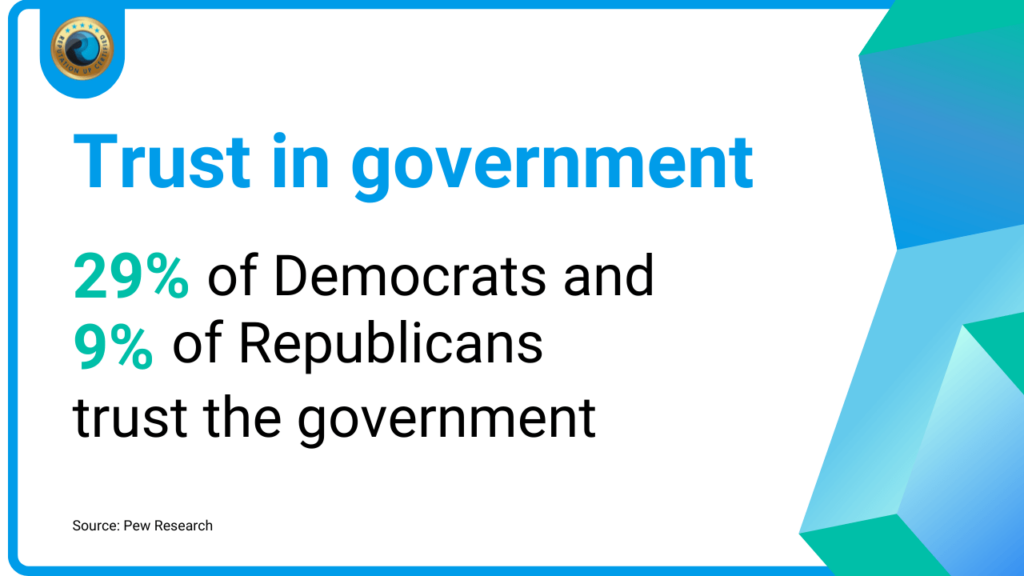
What are the reasons for such a low percentage?
Sometimes poor personal reputation management or unpopular government decisions can lead to a drop in approval.
However, one of the most effective ways to gain the trust of voters is to be open and honest about all aspects of the campaign.
This includes full disclosure of who is funding the campaign, how the funds are being used, and what the campaign’s goals and strategies are.
Trust, on the other hand, is built through consistent action and authentic communication.
This means avoiding empty promises or misleading statements and instead providing accurate, verifiable information.
Another way to build trust is through direct interaction with constituents.
These interactions provide an opportunity to demonstrate competence and authenticity, two key factors in building trust.
But building trust and the need for a certain level of transparency is also demanded by voters from social network structures.
As a result of pressure from users and public opinion in the run-up to the 2020 elections, Meta, for example, has decided to establish a collaboration with external actors:
“To better understand the impact of Facebook and Instagram on key political attitudes and behaviors during that election cycle.
[…] The experimental findings add to a growing body of research showing there is little evidence that key features of Meta’s platforms alone cause harmful ‘affective’ polarization or have meaningful effects on these outcomes.”
Measurement and evaluation of results in political marketing
A political marketing strategy, no matter how well planned, is only effective if it produces the desired results.
Measuring and evaluating results are therefore critical steps in the political marketing process.
A good brand monitoring tool is very useful in this sense, but in addition to social media-based indicators, it is also important to consider more traditional metrics such as conversions.
These can include anything from signing up for a newsletter to buying campaign merchandise.
In addition, the evaluation of results should include a detailed analysis of return on investment (ROI).
This involves comparing the cost of the campaign with the benefits received.
Meta has created an Ad Library Report that allows you to filter and view ad costs for a specific time period and reference country.
Since November 2018, in the UK, £ 148.588.925 has been invested in ads on social issues, elections or politics, distributed across 1.010.523 publications.
In the USA, since May 2018, the investment is about $ 4.012.701.565, for 15.490.826 publications.
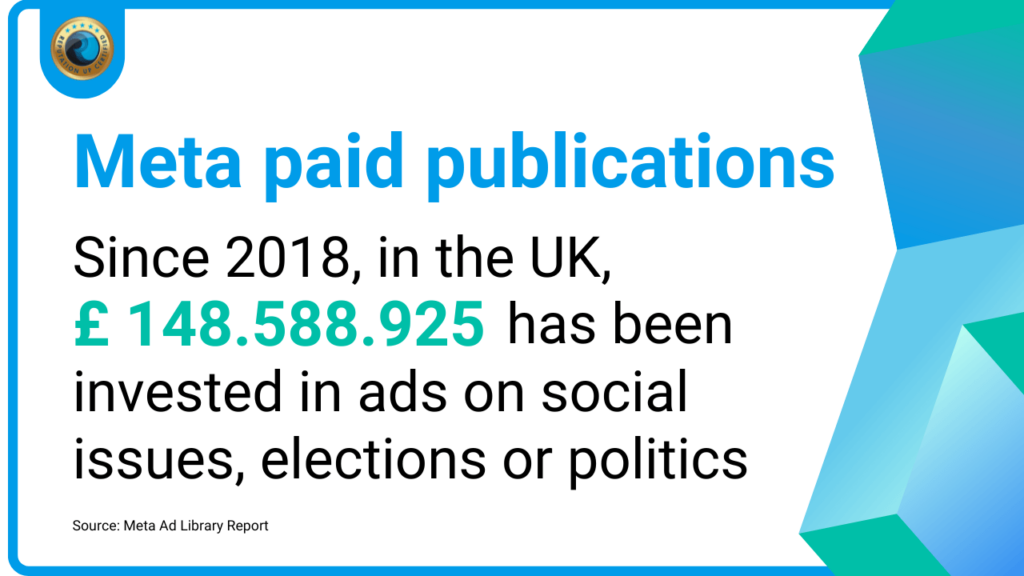
Key performance indicators (KPIs) in online political marketing
Key Performance Indicators (KPIs) are quantifiable metrics used to evaluate the effectiveness of an online political marketing strategy.
They provide an objective framework for measuring success and identifying areas for improvement.
Here are some key KPIs:
- Engagement rate, which measures user interaction with campaign content.
This can include likes, shares, comments and other forms of social media interaction.
A high engagement rate indicates that the campaign is generating interest and dialogue;
- Reach, which is the total number of people exposed to the campaign messages.
It can be measured across multiple channels, including social media, email and online advertising.
StackAdapt reports that political ad spending will exceed $11 billion by 2024.

High reach is key to increasing campaign awareness and impact.
- Conversion, which measures the effectiveness of the campaign in getting users to take a specific action, such as signing up for a newsletter or making a donation.
Sentiment analysis can also be used as a qualitative KPI.
It analyzes the opinions and emotions expressed online about the campaign or candidate.
Positive sentiment can indicate a strong online reputation and a greater likelihood of electoral success.
Data analysis and feedback to improve policy strategies
Feedback and data analytics are essential tools for any political campaign seeking success.
Data collected through various channels, such as social media, email or content marketing campaigns, and online advertising platforms, provides a goldmine of information.
This data can include metrics such as engagement rates, reach, conversions, and ROI, all of which are key KPIs.
But the analysis shouldn’t stop there: it’s equally important to collect qualitative feedback from sources such as surveys, focus groups, and direct interactions with constituents.
This feedback can provide valuable insights into audience perceptions, campaign strengths and weaknesses, and areas for improvement.
Once collected, this data and feedback needs to be analyzed in depth.
Data analytics tools such as Google Analytics, customer relationship management (CRM) platforms, and sentiment analysis software can help decipher this complex data and turn it into actionable insights.
These insights should then be used to refine the political marketing strategy.
Conclusions
In a world where technology is increasingly present in all areas of human existence, any marketing strategy must include and emphasize the online aspect.
This is especially true for political marketing.
Here are some of the considerations that can be drawn from this comprehensive guide:
- 42% of U.S. users saw false or misleading information about political issues online in February this year, compared to 18% of Japanese;
- 65% of U.S. adults are gathering information about upcoming elections through digital channels;
- 72% of Americans believe that Internet companies should not share information about their users with political campaigns; 7% agree with sharing personal information;
- The average open rate for political email is 22.94%;
- A well-executed SEM campaign generates an ROI of 275%;
- Since November 2018, in the UK, £ 148.588.925 has been invested in ads on social issues, elections or politics, distributed across 1.010.523 publications; in the USA, since May 2018, the investment is about $ 4.012.701.565, for 15.490.826 publications;
- By 2024, spending on political advertising will exceed $11 billion.
With misinformation on the rise and privacy at the forefront of the debate, it is essential to have a trusted partner to manage and protect your online reputation.
Trust the industry leader, ReputationUP, to ensure your online presence is authentic, transparent and respected.
FAQ
In a world dominated by technology, most adults use digital channels to get information and interact with political content. Ignoring the online aspect would mean losing a large part of an active and informed electorate.
A short list of the most important: target audience research and analysis; creation of a solid digital identity; content management and creation of relevant political messages; use of social media to extend reach; online reputation monitoring and management; email marketing and SMS marketing; SEM campaigns and online advertising.
It starts with in-depth research to understand your target audience and their needs. A clear strategy is developed based on the campaign objectives and an authentic digital identity is created. The chosen message is delivered across multiple channels and the campaign is constantly monitored.
Political ads are advertisements created to promote a candidate, party or political cause. They can appear on various channels such as television, radio, newspapers and, increasingly, digital platforms such as social media and websites.
Political advertising aims to influence public opinion and persuade voters. With the advent of digital, political advertising has evolved to include targeted ads, SEM campaigns and social media advertising, allowing for more precise segmentation and direct engagement with voters.
Online reputation is critical to a political campaign because it determines the first impression voters get. Online messages directly influence voting decisions and have greater longevity than traditional media. A strong reputation facilitates interaction with voters and helps manage crises and disputes.

